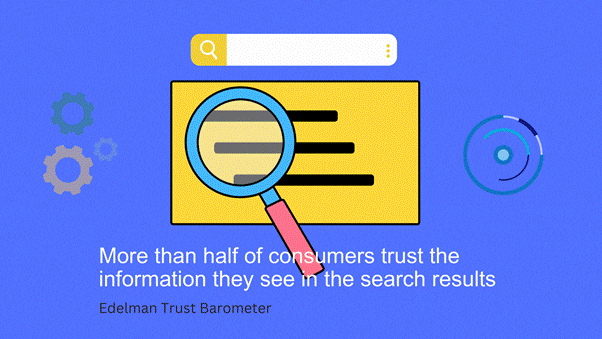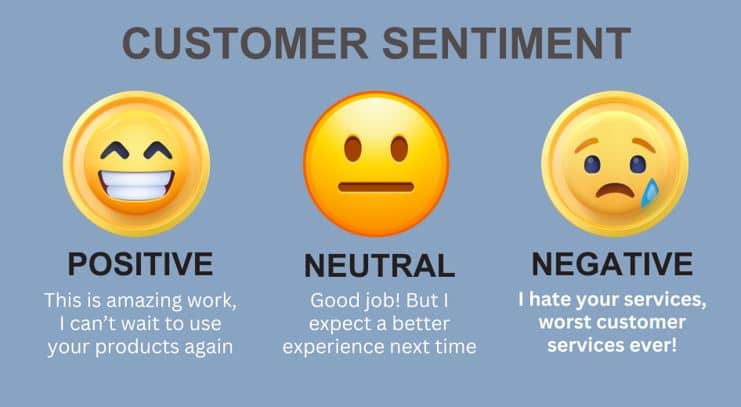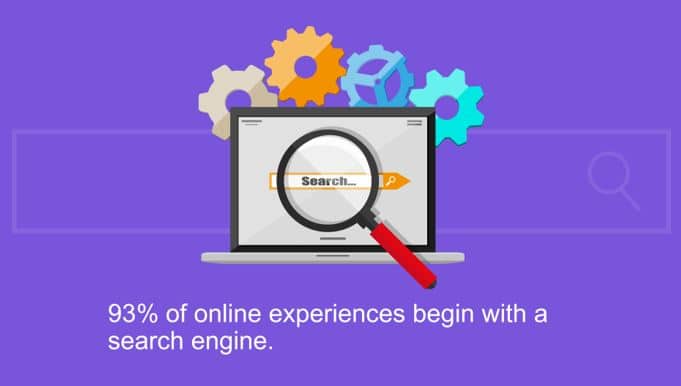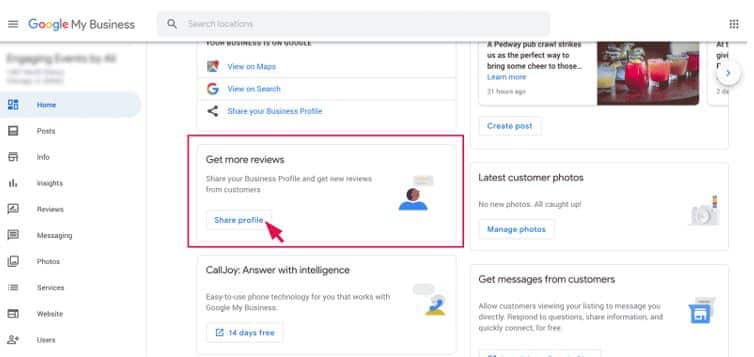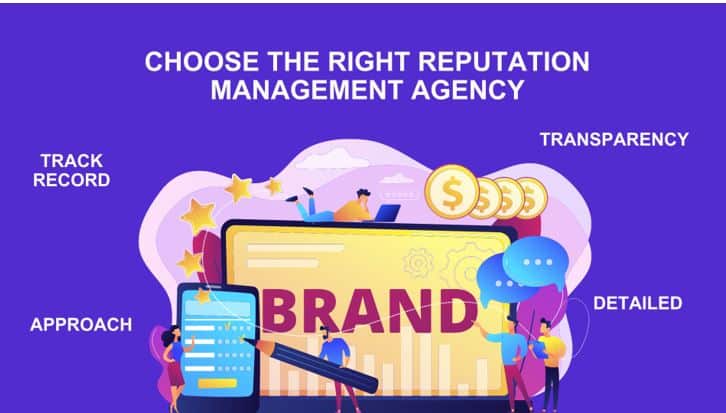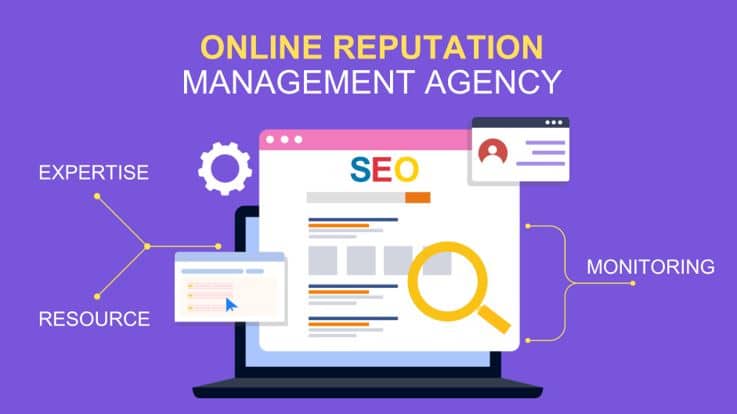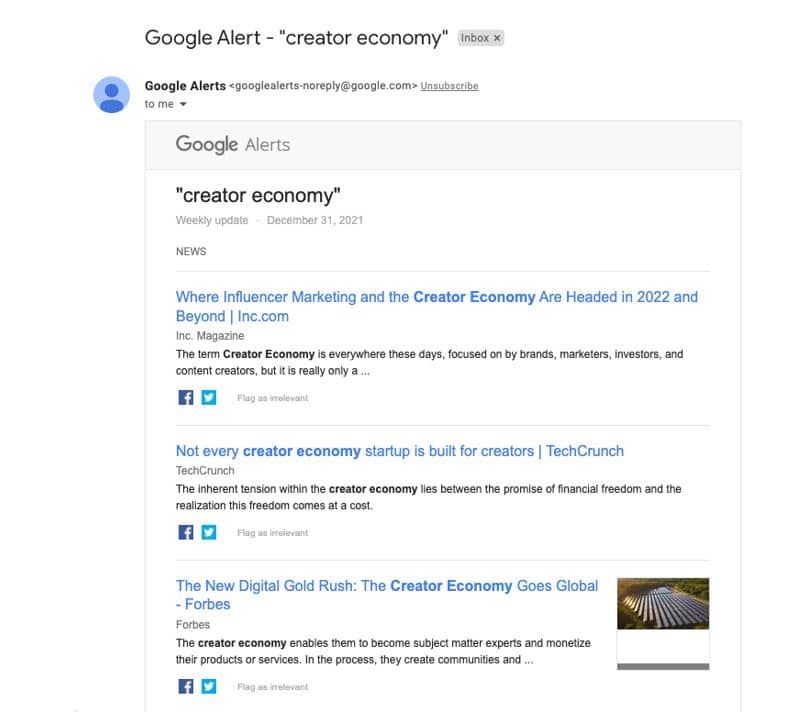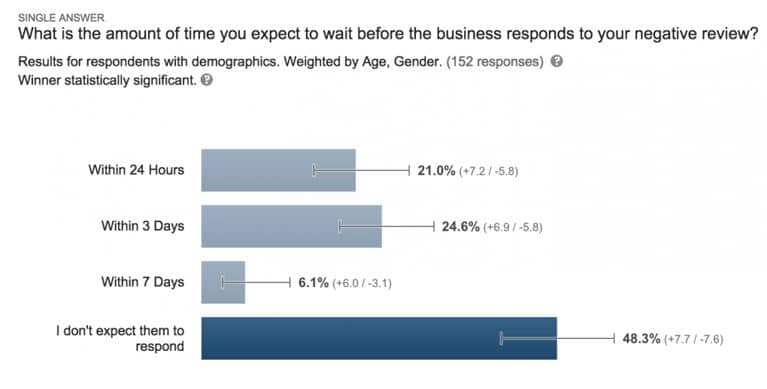How do you build and manage your online reputation?
Online reputation management (ORM) is the art of shaping how people (mostly your target audience) see you or your business on the web.
Think of it as your digital first impression, and as they say, “You never get a second chance at a first impression.”
When researching a business, 65% of consumers trust the information they see in the search results, according to the Edelman Trust Barometer.
Therefore, you need to push ‘positive’ information about your business to the top of Google.
What is Online Reputation?
Your online reputation is how your customers and target audience perceive you on the internet. It’s what others think about you or your business based on what they read or watch about your brand or product.
Start listening to what people (i.e., your audience) say about you.
Whether it’s positive, neutral, or negative, these are customer sentiments you can improve upon.
A positive online reputation can boost trust and credibility, while a negative one may deter people.
Individuals and businesses must continuously manage and enhance their online credibility if they ever want to thrive.
How the Internet Shapes Perception
Today, your online presence is often the first touchpoint people have with you.
With just a quick search, anyone can tell whether you or your business is credible and worth it.
A whopping 93% of online experiences begin with a search engine.
The search engine is usually the first port of call to your business.
Ever Googled a business before trying it out? You’re not alone; 87% of shoppers do the same, according to LinkedIn.
Customers are forming opinions about you based on what others have shared online. This goes beyond having a website; it’s about creating an image that resonates with your audience.
How Positive Online Reputation Impacts Sales and Revenue
A positive online reputation can boost sales and revenue.
Let’s explore some of the proven ways a credible online presence directly translates into tangible business success:
1. Building Trust and Credibility:
- Positive online reviews and testimonials foster trust among potential customers.
- A credible online presence positions your brand as reliable and reputable.
2. Influencing Purchase Decisions:
- Consumers actively seek information online before making purchasing decisions.
- Positive reviews and a strong online reputation influence their choice in your favor.
3. Attracting New Customers:
- A positive digital standing acts as a magnet for new customers.
- Potential clients are more likely to choose a business with a stellar online reputation.
4. Encouraging Repeat Business:
- Satisfied customers, influenced by positive online experiences, are more likely to become loyal patrons.
- A positive reputation encourages repeat business and fosters customer loyalty.
5. Increasing Competitive Edge:
- In a competitive market, a positive online reputation differentiates your brand.
- It gives you a competitive edge, making customers more inclined to buy your product/service.
Every business has an online image, whether they realize it or not. Even if your business doesn’t take orders online or interact with online consumers, you still must take care of your online reputation.
Take Domino’s Pizza, for instance.
As seen in the tweet above, they turned their ship around by not just responding to a funny (yet negative) review by guiding the customer accordingly.
It’s a lesson in turning criticism into positive feedback and an opportunity for growth.
In essence, a positive online reputation is a revenue driver. It makes the customers happy.
Customers, informed by positive online experiences, not only choose your business but become advocates, contributing to a sustained cycle of increased sales and revenue.
How to Build a Positive Online Presence
Building a robust online presence must be strategic. Here are 5 actionable ways to elevate your digital standing:
1. Create Quality Content:
“Quality” is relative. Our definition of quality may be completely different from yours.
What you should focus on is creating engaging and helpful content.
If you answer your customers’ questions and inspire them to buy your product or use your services, then you’ve succeeded in creating ‘quality’ content.
To make content creation easier, infuse ideas and thoughts that reflect your expertise and values.
Share informative blog posts, engaging videos, and valuable social media updates. Be authentic, and let your unique voice shine through.
2. Optimize for SEO:
Identify relevant keywords you can target in your content. Use the free Google Keywords Planner to find the keywords.
Seamlessly integrate these keywords into your content pages to increase your odds of ranking on Google’s organic first page results.
Interlink relevant pages on your website, ensuring there’s no orphan page (or a page with no incoming or outgoing link).
3. Leverage Social Media:
Engage actively on platforms relevant to your audience. If you’re a business professional, LinkedIn and Twitter might be the perfect platforms to begin.
When you’re ready to create videos, then YouTube is the #1 platform.
On the other hand, if you sell physical products (e.g., shoes) online, Instagram, TikTok, and of course, YouTube are the ideal social media platforms to embrace.
In addition to creating social media posts, respond promptly to comments and participate in conversations.
Showcase your brand’s personality and values through thoughtful posts and engagement.
4. Encourage Positive Reviews and Testimonials:
Actively seek feedback from satisfied customers.
If you’re a local business, then encourage customers to leave positive reviews and testimonials on your Google My Business profile, on Yelp, and other local directories.
Simply copy and share your Google My Business profile link with your customers and ask them for feedback.
Share these reviews and endorsements on your website and social media platforms to win new sales.
5. Be Proactive in Online Monitoring:
You don’t have to do it manually. Utilize tools like Google Alerts or Brandwatch to track mentions. Address issues swiftly and thoughtfully.
Stay actively involved in managing your online reputation to prevent potential damage.
Choosing the Right Online Reputation Management Agency
People’s perception about your brand is their reality. So you need to take proactive steps to enhance and present a better image of your business.
But you don’t have to build or manage your online reputation all by yourself.
If you have a marketing budget, you could get tremendous results by outsourcing this complex task to Rank Secure, a professional online marketing company.
Here are 5 key factors to consider when entrusting your digital standing to the experts:
1. Proven Track Record:
A track record speaks volumes. Look for an agency with a history of successfully managing and enhancing online reputations for businesses in your industry.
Past achievements are indicative of their capability to navigate the complexities of the digital realm.
2. Transparency and Communication:
Transparent communication is the bedrock of a successful ORM partnership.
The agency should keep you informed about strategies, progress, and any potential challenges. Open lines of communication ensure a collaborative and effective approach.
At Rank Secure, we’ll keep you in the loop at all times, and even ask for your feedback and suggestions. After all, it’s your online reputation, and not ours!
3. Tailored Approach:
Every brand is unique. A one-size-fits-all approach won’t cut it.
A reputable ORM agency understands this and tailors their strategies to align with your brand’s specific needs, challenges, and goals.
4. Comprehensive Services:
Why does it matter? ORM goes beyond crisis management.
Choose an agency that offers a comprehensive suite of services, including proactive reputation building, review management, search engine optimization (SEO), and crisis response.
A holistic approach ensures your brand is resilient in the face of both challenges and opportunities.
5. Client Reviews and Testimonials:
Before you hire an expert, look out for reviews and testimonials.
A reputable ORM agency should have positive reviews and documented success stories from satisfied clients.
These firsthand accounts are invaluable insights into the agency’s effectiveness and the experience of working with them.
Why Should I Go the ORM Agency Route?
The truth is that an online reputation management company can take the burden off your shoulders, and use their resources and experiences to grow your business.
An ORM agency offers:
- Expertise and Experience: They bring a wealth of expertise and experience to the table. Their insights, honed through managing diverse online reputations, can navigate the nuances of the digital landscape effectively.
- Time and Resource Efficiency: Managing online reputation requires time and specialized skills. A dedicated agency can free up your internal resources so that you can focus on core business activities.
- Continuous Monitoring and Adaptation: The digital landscape is ever-evolving. ORM agencies stay vigilant, continuously monitoring changes and adapting strategies accordingly.
This ensures your brand remains resilient in the face of emerging trends and challenges.
Choosing the right ORM agency is not just a service; it’s an investment in the longevity and success of your brand. It’s a strategic move that leads to sustained growth and positive impact.
Monitoring and Assessing Your Online Reputation
To get the best out of your online presence, it needs to be monitored and assessed.
Essentially, you need to proactively listen, learn, and adapt. So what tools do you need for that?
1. Use social listening tools:
- Google Alerts: This is a free tool that notifies you whenever your brand is mentioned online. If it’s a negative mention, you could contact the website or publisher to remove or replace it.
If you’re a content creator, for example, and want to stay abreast with everything happening in the creator economy, Google alerts can notify you via email whenever the term is mentioned online — in the news, social media, websites, or online directories.
- Brandwatch: Use this tool to monitor your social media mentions — on Twitter, Facebook, Instagram, and any other platform.
2. Analyzing feedback:
- Numbers and comments are the raw materials for shaping your online narrative.
- Positive feedback influences customers to trust your brand, but even the negative reviews can be beneficial — especially when you respond promptly and clarify issues.
This study reveals that 97% of consumers read businesses’ responses to reviews, emphasizing the importance of your engagement.
3. Understanding sentiment:
- Are customers praising your exceptional service or expressing concerns about delivery times?
- Assessing feedback helps you spot patterns and make informed decisions.
- It’s not about obsessing over every comment but rather discerning the signals amidst the noise.
4. Strategically responding to reviews:
- A sincere acknowledgment of positive feedback strengthens customer relationships.
- A thoughtful response to criticism showcases your commitment to improvement.
Research indicates that 21.0% of customers expect businesses to respond to their negative reviews within 24 hours, underlining the importance of timely engagement.
Take Airbnb, for example.
They transformed negative feedback about an Airbnb host who tricked a guest.
They responded quickly and the guest was happy, especially with the timely response.
Your online reputation reflects not just what you say but the stories others share about your brand.
At Rank Secure, we specialize in helping businesses through SEO and online reputation services.
Let’s optimize your best content to rank higher on Google organic results, boost your social media engagement and reputation, and grow your revenue.
Book a free strategy session today to speak to an expert.


